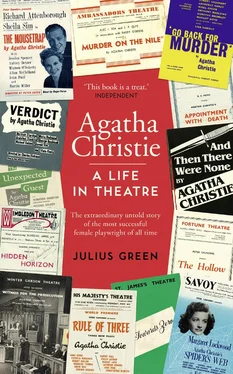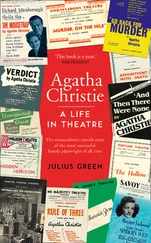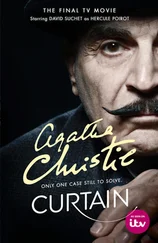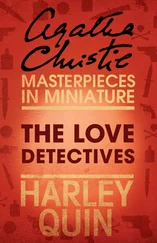Shakespeare is ruined for most people by having been made to learn it at school; you should see Shakespeare as it was written to be seen, played on the stage. There you can appreciate it quite young, long before you take in the beauty of the words and the poetry. I took my grandson, Mathew, to Macbeth and The Merry Wives of Windsor when he was, I think, eleven or twelve. He was very appreciative of both, though his comment was unexpected. He turned to me as we came out, and said in an awestruck voice, ‘You know, if I hadn’t known beforehand that that was Shakespeare , I should never have believed it.’ This was clearly meant to be a testimonial to Shakespeare, and I took it as such. 8
Agatha and her grandson particularly enjoyed the knockabout comedy of The Merry Wives of Windsor :
In those days it was done, as I am sure it was meant to be, as good old English slapstick – no subtlety about it. The last representation of the Merry Wives I saw – in 1965 – had so much arty production about it that you felt you had travelled very far from a bit of winter sun in Windsor Old Park. Even the laundry basket was no longer a laundry basket, full of dirty washing: it was a mere symbol made of raffia! One cannot really enjoy slapstick farce when it is symbolised. The good old pantomime custard trick will never fail to rouse a roar of laughter, so long as custard appears to be actually applied to a face! To take a small carton with Birds Custard Powder written on it and delicately tap a cheek – well, the symbolism may be there, but the farce is lacking. 9
Agatha’s letters to her second husband, Max, during his wartime posting to Cairo are full of enthusiastic descriptions of her visits to the major Shakespearian productions of the day, including those presented by the Old Vic Company at the New Theatre, their London base towards the end of the war. Her critiques of the productions and the performances of the leading classical actors of the day, and her insightful interpretations of the characters’ motivations, display a comprehensive knowledge of the Shakespearian repertoire. She also shows a keen interest in Shakespeare’s craft as a playwright. Commenting on the fact that he did not devise original plots she says, of the era in which he wrote:
I think the playwright was rather like a composer – he had to find a libretto for his art (like a ballet nowadays). ‘I should like to do a setting of Hamlet, or my version of Macbeth etc.’ Inventing a story was not really thought of. ‘What is the argument?’ Claudius asks in Hamlet before the players begin. The argument was a set thing – you then exercised your art on it … I think plays tended to be loose on construction, because they incorporated certain ‘turns’ – like the music halls … He saw a play as a series of scenes in which actors got certain opportunities. Rather like beads on a necklace– the thing to him remained always individual beads strung together. 10
Shakespeare’s portrayal of female characters particularly engaged Agatha – ‘All Shakespeare’s women are very definitely characterized – he was feminine enough himself to see men through their eyes’ 11– and she was intrigued by Oxford academic A.L. Rowse’s disputed identification of the ‘Dark Lady’ of Shakespeare’s sonnets. Rowse, in turn, was an admirer of Christie; ‘We must not underrate her literary ambition and accomplishment, as her publishers did, simply because she was the first of detective story writers.’ 12Meanwhile, Christie trivia buffs can spend many happy hours identifying the numerous Shakespearian references in the titles and texts of her works. To get the ball rolling, I will pose the question, what were the two plays she wrote that took their titles from Hamlet ?
Agatha was as enamoured with the backstage world of theatre as she was with the performance itself. ‘I don’t think, that there is anything that takes you so much away from real things and happenings as the acting world,’ she wrote to Max in 1942. 13‘It is a world of its own and actors never are thinking of anything but themselves and their lines and their business, and what they are going to wear!’ And she says in her autobiography, ‘I always find it restful to stay with actors in wartime, because to them, acting and the theatrical world are the real world, any other world was not. The war to them was a long drawn-out nightmare that prevented them from going on with their own lives, in the proper way, so their entire talk was of theatrical people, theatrical things, what was going on in the theatrical world, who was going into E.N.S.A. – it was wonderfully refreshing.’ 14To Agatha Christie, whose imaginary world has offered a welcome escape for so many, the world of theatre offered one to her.
Agatha shared with her theatrical friends the excitements and disappointments of live performance – ‘Lights that do not go out when the whole point is that that they should go out, and lights that do not go on when the whole point is that they should go on. These are the real agonies of theatre’ 15– and in particular the agonies of first nights:
First nights are usually misery, hardly to be borne. One has only two reasons for going to them. One is – a not ignoble motive – that the poor actors have to go through with it, and if it goes badly it is unfair that the author should not be there to share their torture … The other reason for going to first nights is, of course, curiosity … you have to know yourself . Nobody else’s account is going to be any good. So there you are, shivering, feeling hot and cold alternately, hoping to heaven that nobody will notice you where you are hiding yourself in the higher ranks of the Circle. 16
Christie trivia buffs can again spend happy hours identifying the numerous theatrical references, characters and scenarios in her novels; I offer for starters 1952’s They Do It with Mirrors , in which Miss Marple is fascinated by the stage illusion involved in the creation of a production of a play that rejoices in the Christiesque title ‘The Nile at Sunset’. And it is no coincidence that disguise is a recurring plot device in her plays, a number of which feature characters who are impersonating someone else. This conceit accounts for Christie’s two greatest coups de théâtre , in The Mousetrap and Witness for the Prosecution ; the latter is carried out with a high level of theatrical skill by a character who is a professional actress, in a plot twist with echoes of her 1923 short story, ‘The Actress’. 17
Agatha Christie is herself one of the most written about of writers. Much of what has been published about her, however, engages either with the highly seductive imaginary world of her novels or with endlessly re-examined elements of her personal life; even those writers who do make a serious attempt to place her work in a historical and literary context tend to overlook her contribution as a dramatist. Alison Light’s persuasive study of Christie’s work as an example of ‘conservative modernity’ in Forever England (1991) focuses on the inter-war period and so can be excused for overlooking her plays. But other serious assessments of her work, from Merja Makinen’s Agatha Christie: Investigating Femininity (2006) and Susan Rowland’s From Agatha Christie to Ruth Rendell (2001) to Gillian Gill’s Agatha Christie: The Woman and her Mysteries (1999) and Agatha Christie in the Modern Critical Views series (edited by Harold Bloom; 2001), are united in their neglect of her work as a playwright. Ironically, many of the writers concerned may well have found an engagement with Christie’s work for the stage to have been beneficial to their arguments.
Читать дальше












